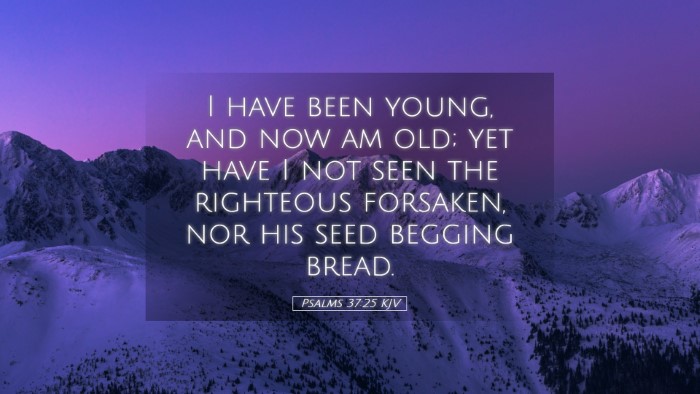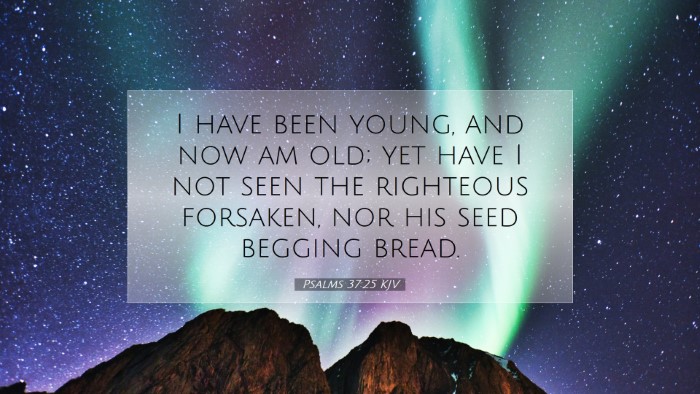Psalms 37:25 Commentary
Verse: "I have been young, and now am old; yet have I not seen the righteous forsaken, nor his seed begging bread."
Introduction
This poignant verse from the Psalms encapsulates a profound observation about divine providence and the faithfulness of God towards the righteous. The psalmist, traditionally attributed to David, reflects on the course of his life, affirming that he has not witnessed the forsaking of the righteous nor their descendants in dire lack. Throughout the ages, this passage has provided comfort and assurance to believers, emphasizing God's commitment to His people.
Contextual Overview
The broader context of Psalms 37 speaks to the contrast between the wicked and the righteous, urging believers to trust in the Lord and to commit their ways to Him. David provides insights into the struggles faced by God’s people, particularly as they observe the success of the wicked and the challenges of the righteous. The psalm serves as a reminder of the inherent justice of God and His ultimate control over human affairs.
Insights from Matthew Henry
Matthew Henry emphasizes the personal experience that David shares in this verse. He notes that the phrase "I have been young, and now am old" denotes a profound journey through life. Henry argues that this reflection illustrates God's faithfulness through all stages of life, from youth to old age. He suggests that the testimony of David underlines a universal truth—that the righteous will ultimately witness God’s provision and care.
Henry further elaborates on the phrase "nor his seed begging bread," relating it to the idea of generational blessing. He interprets it as a promise that not only the righteous will receive sustenance, but also their descendants. This prophetic declaration highlights a covenantal relationship between God and His followers, indicating that divine care extends beyond the individual to future generations.
Thoughts from Albert Barnes
Albert Barnes approaches this verse with a focus on the assurance it provides to the faithful. He argues that this statement serves as an affirmation of God’s promise to provide for those who walk in righteousness. Barnes points out that the emphasis on "not seen" indicates the subjective experience of the righteous, contrasting it with the observable reality of life. The absence of begging among the descendants of the righteous is also seen as a testimony to God's bounty.
Barnes encourages believers to rest in the truth of this verse, positing that there should be confidence in God's ability to care for His people regardless of circumstances. He highlights the importance of faith as an active response to the promises laid out in scripture.
Reflections from Adam Clarke
Adam Clarke comments on the human experiences reflected in this verse and identifies the emotional weight behind David’s reflection. Clarke interprets David's assertion as a statement filled with experiential knowledge. He notes that the psalmist has not merely read or heard of God’s faithfulness but has lived it. This personal testimony amplifies the authoritative nature of the claim.
Clarke also sheds light on the socio-economic realities of the time, explaining that begging was often a visible indicator of God’s judgment or displeasure. Thus, the absence of the righteous begging is indicative of God’s favor and blessing, an assurance that the faithful can stand on throughout their lives.
Theological Implications
The implications of Psalms 37:25 reach deeply into the fabric of Christian theology. The confidence expressed by the psalmist serves as a cornerstone for understanding God’s providence. From a theological perspective, this verse anchors the believer's hope in divine provision, countering the pervasive doubts that arise from life's adversities.
- Trust in God's Faithfulness: At its core, this verse underscores the necessity of trust in God’s enduring faithfulness to the righteous.
- Generational Blessing: The concept of descendants not begging adds a layer of understanding to God's covenantal promises that extend beyond individual lives.
- The Reality of Righteousness: The verse posits that there is a distinct reality associated with being counted among the righteous; God’s provision is linked to one's spiritual standing.
Practical Applications
This verse offers rich practical applications, especially for pastors and spiritual leaders who seek to inspire faith in their congregations. The themes of divine provision and faithfulness can be pivotal in teaching and pastoral care. Here are a few applications:
- Encouragement during Trials: Pastors can draw from this verse to reaffirm God's unwavering support during difficult times.
- Building Faith in Future Generations: Emphasizing God’s promise not just for individuals but for families reinforces the importance of spiritual legacy.
- Spiritual Assurance: This passage can serve to instill confidence in believers that they are cared for by God, significantly influencing their ability to face life's uncertainties.
Conclusion
Psalms 37:25 stands as a profound testament to the unfailing nature of God’s provision for the righteous. Reflecting on life's journey from youth to old age, the psalmist provides a powerful affirmation of trust in divine care, which resonates across generations. Through the insights drawn from esteemed commentators like Matthew Henry, Albert Barnes, and Adam Clarke, we gain a richer understanding of this verse, grounding ourselves in the confidence that God does not forsake those who follow Him. As individuals engage with this scripture, they are reminded of the importance of faith and righteousness, leading to a life marked by assurance and divine sustenance.


